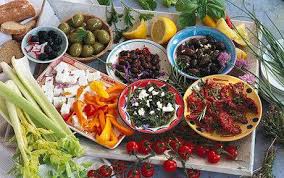Omega-3 are polyunsaturated fats, found in fish oils, found in many Mediterranean foods which part of the Mediterranean Diet, and have beneficial properties for human health. It contributes: to avoid heart disease, reduce blood fat, reduce hypertension (high pressure) to prevent clots, better blood circulation, reduce depression, improve brain function and therefore fewer chance of developing Alzheimer’s disease, protecting the fetus during pregnancy by various forms of allergies such as pollen allergies, asthma, food allergies, and skin allergies (eg eczema), and reduction of osteoporosis in women who have passed the period of menopause and less pain in women who are in menstruation.
The vitamin B or B vitamins, found in many Mediterranean foods, are necessary for proper human development and a host of other bodily functions. They play an important role in the action of enzymes, proteins which regulate the chemical reactions in the body necessary for converting food into energy.
Vitamin B6 is a water soluble vitamin meaning that it dissolves in water but the body cannot store them. The amounts of vitamin remaining in the body are excreted through urine. This means you need a continuous supply of these vitamins in your daily diet. Vitamin B6 improves the immunity of our system and enables it to produce antibodies to fight various diseases and in maintaining proper nerve function and also in the production of red blood cells. Vitamin B6 can be found in Mediterranean foods like nuts, beans, legumes, eggs, fish and cereals, all of which are basic Mediterranean foods part of the Mediterranean diet.
Vitamin B12 is unique because the body can store it in the liver for years and it is water soluble. Vitamin B12, like other B vitamins are important for metabolism. It helps produce the vital red blood cells; it is responsible for the smooth functioning of the central nervous system and regulates the use of folic acid and carbohydrates. Vitamin B12 can be found in milk, dairy products like white cheese, eggs, meat, poultry, shellfish, all of which are Mediterranean foods, part of the Mediterranean diet.
Vitamin B9 or otherwise folic acid is also a water-soluble vitamin. It helps the body to develop new healthy cells. Folic acid is especially active for the reduction of:
1. Levels of homocysteine in humans which levels are high but suffer from kidney failure – well, high levels of homocysteine directly linked to cardiovascular disease and stroke
2. Side effects of methotrexate in pharmaceutical formulations sometimes used to treat rheumatoid arthritis and psoriasis – taking folic acid appears to help reduce symptoms of nausea and vomiting in fact side effects of methotrexate
3. The risk of developing certain congenital birth defects or neural tube defects when taken by pregnant women
Additionally, taking folic acid is probably responsible for:
4. reducing the risk of developing colorectal cancer or cancer of the cervix
5. reduction of breast cancer
6. Reduction of depression when used in synergy with conventional antidepressant medications
7. treatment a skin disease known as vitiligo
8. Curing gum disease during pregnancy when included in a mouthwash
9. Reducing the risk of developing pancreatic cancer
10. Minimizing memory loss
11. Preventing Alzheimer’s
12. Reducing hearing loss due to aging
13. Preventing osteoporosis
14. Easing muscle pain
The products are rich in folic acid include green vegetables, fruits, dried beans, peas, nuts, grains and multigrain breads, the very basic Mediterranean foods that should be taken daily. They are in the daily section of the Mediterranean pyramid.
Vitamin E is a fat-soluble vitamin that acts as an antioxidant. Vitamin E is an antioxidant that protects the body from tissue damage that may result from free radicals. Free radicals can damage cells, tissues and organs – are also believed to play an important role in the development of specific diseases associated with aging. Additionally, vitamin E is important for the formation of red blood cells and helps the body use vitamin K. The ability of vitamin E for prevention of diseases or conditions such as cancer, cardiovascular disease, dementia, liver disease, and stroke is not yet proven. But at lower volumes, it has become clear that vitamin E helps prevent cardiovascular diseases. The best way to get essential vitamins is to have a balanced diet, Mediterranean Diet, through a variety of foods. Some of the foods that are rich in vitamin E are the nuts, olives, asparagus and other green vegetables, the basic Mediterranean food.
As it can be concluded Mediterranean foods can only help and improve various body conditions and at the same prevent various diseases and make us all healthy.















{ 0 comments… add one now }